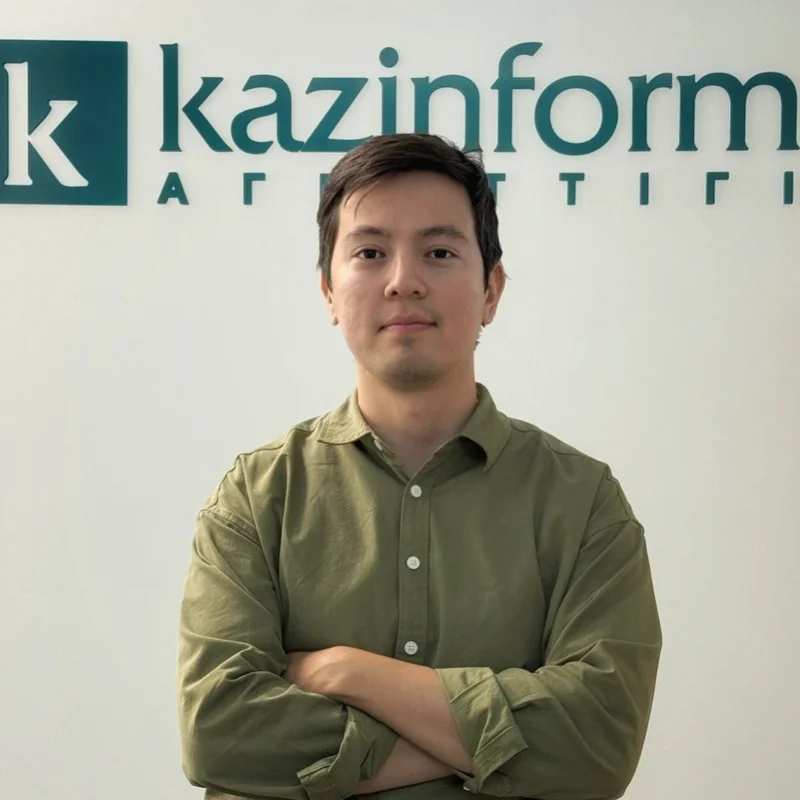"If you want to go far, go together" — Slovenia's President on building stronger bonds with Kazakhstan
In an exclusive interview with Kazinform News Agency, Slovenian President Nataša Pirc Musar discussed the significance of her visit to Kazakhstan, the growing diplomatic and economic ties between the two nations, and the potential for future cooperation in different areas. She also highlighted the importance of multilateralism, Slovenia’s role in global diplomacy, and music of Dimash Qudaibergen.
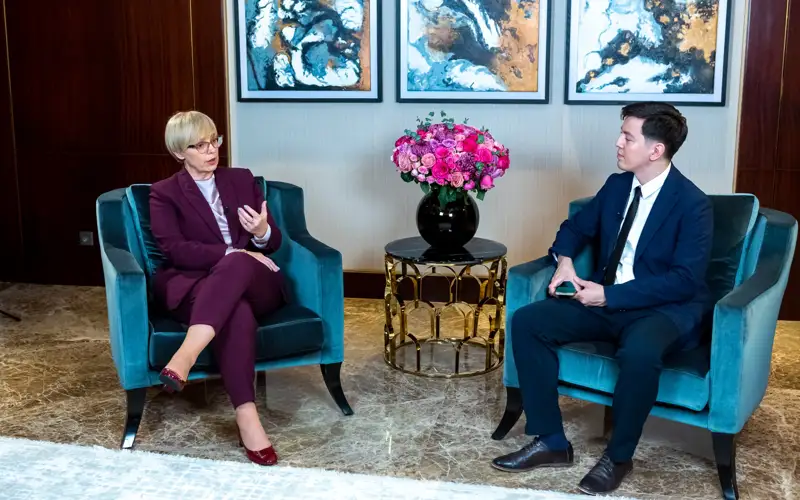
- Madam President, your visit to Astana marks the first official visit of a Slovenian President to Kazakhstan in 15 years. This demonstrates a strong commitment from both Astana and Ljubljana to deepening bilateral political dialogue and economic cooperation. Could you elaborate on what the future holds for the relationship between Slovenia and Kazakhstan? Additionally, has the newly opened Embassy of Kazakhstan in Slovenia given its additional momentum?
If I start with the last part of your question, I would say it was a marvelous sign that Kazakhstan decided to open an Embassy in Ljubljana. Having a resident ambassador makes life much easier for diplomats—it helps them better understand the country, its business environment, and its political life. We are now in the process of offering Kazakhstan a non-resident ambassador.
Of course, I do hope that your country understands that being a country with a population of two million, we cannot have an embassy in every country on this planet. So we have to prioritize. But we are offering a non-resident ambassador, who will not cover Kazakhstan from other countries, like it is now, where your country is covered from Moscow, Russia. However, there will be one person, a so-called "roving ambassador," who will be fully dedicated only to Kazakhstan.
So this is what we will offer in the near future. It’s in the process. But first of all, I would like to thank your President, Mr. Tokayev, for inviting me to Kazakhstan. We met for the first time when I had been President for only half a year, in New York at the General Assembly at the United Nations, and we had a really informative and contentful conversation on a bilateral level.
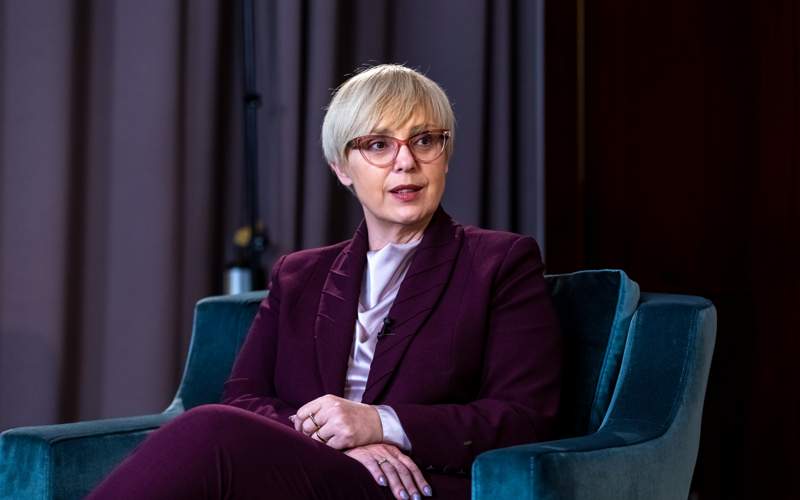
And this was the time when I said, well, Kazakhstan is a very interesting country. To be honest, politically and economically, geographically small countries have to be more open-minded than superpowers. Slovenia is currently holding a non-permanent seat at the Security Council, so we are aware of what is going on in the world. But of course, we are also aware that Slovenia has been a member of the European Union, which is the third strongest economy in the world.
The European Union is, of course, our priority. But I often say, Slovenia is not a lonely island in the middle of the ocean. We have to cooperate with other nations. And my main motto is that if we are politically well connected, and we do not have any open questions with Kazakhstan, and we have had diplomatic relationships for 33 years already, it makes life easier for the economy. A good economy means you can also have a good social welfare state. That’s the synergy we are striking for. And, as I said, to have good political relationships, we can open many doors for businesses. And that’s the reason why I’m here.
And I'm really, really happy to see the warm reception and the willingness of Kazakhstan to cooperate with countries around the globe. I think we are quite like-minded in this regard. Kazakhstan is, of course, 10 times bigger than Slovenia. You are the leader in Central Asia regarding the economy. You try to maintain a neutral political position right now in this very multipolar, crazy world, if I may say.
So I do admire your President and your country with the wisdom that you do possess in this hard moments that the planet Earth is facing.
- Here in Astana you are accompanied by the high-level business delegation, representing leading Slovenian industries at Kazakhstan-Slovenia Business Forum. What economic impact do you expect this forum to have for both Astana and Ljubljana?
There is only one way, and that way is progress. I often say, if you want to go fast, go alone, but if you want to go far, go together. And that applies to both politics and the economy. Yes, this is the largest delegation I've brought to Kazakhstan since I became president for two years and three months. 25 really renewed and high-profile companies are here.
The bilateral economic exchange is, I would say, modest—currently at 163 million euros. Just to give you a comparison, our largest trade partner is Switzerland, due to the pharmaceutical companies, and it's 32 billion euros annually. The second-largest partner is Germany, with 15 billion euros, and Slovenia's GDP is currently 72 billion euros. Yours is 288 billion euros, but you're 10 times bigger.
So, the Slovenian economy is really doing well. GDP per capita, this is another statistical number which is showing the greatness of the economy in various countries around the globe. Ours is 34,000 euros per capita, while yours is 12,000 euros per capita. But nevertheless, Kazakhstan has a lot to offer Slovenia, and vice versa. Slovenia has a lot to offer to Kazakhstan.
You are lucky to have oil and natural gas—those resources, the "diamonds" that you do have. Slovenia doesn't have that, which is why we need to be innovative in other fields. Pharmaceuticals is our number one industry, and then we also have forestry, digitalization, and artificial intelligence, which is something very close to the heart of Slovenian young entrepreneurs.
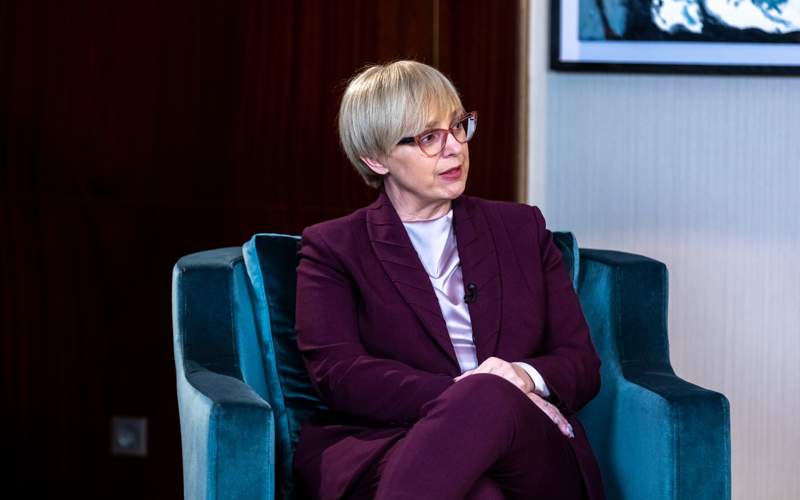
There are many startups working on artificial intelligence, and today I visited the artificial intelligence hub in Astana, as well as the international financial center of Astana. I see that you are doing really, really progressive work on how to gain foreign investors. The European Union is Kazakhstan's biggest foreign investor, with more than half of the investments coming from the EU. Slovenia, as part of the European Union, is one of the 27 member states. But to gain more economical cooperation, we, of course, have to work bilaterally.
This is the reason I'm here. I must tell you, when I announced my trip to Kazakhstan, many Slovenian entrepreneurs said, "We want to come with you, Madam President." They understand that when a president visits a country, many doors are opened, and that's my job to do.
Of course, Slovenian and Kazakh entrepreneurs have to show quality products, and then the bilateral cooperation has no limits, if you ask me.
- So during the political consultations in November 2024, the head of the Slovenian delegation, State Secretary of the Ministry of Foreign and European Affairs, Marko Štucin, reaffirmed his support for liberalizing the visa regime for Kazakhstan and the European Union. In your view, what steps are needed to accelerate this process.
- The process has already started because the European Union is aware of the same fact that I just described—that cooperation with countries outside of the EU is also a necessity for good political and economic relationships. So, the facilitation of short-term state visas is in progress, but also for readmission of Kazakhstani people.
So this is the process which goes together, but of course, you must understand the political structure of the European Union, where all 27 member states must reach a consensus to do that. Slovenia, without a doubt, is a staunch supporter of visa liberalization for Kazakhstan. We will continue to support your country, and after learning more about Kazakhstan, I am even more assured that Kazakhstan deserves a visa liberalization system for short-term visas, readmission, and for business and diplomatic purposes.
So, this is the way forward, and I will continue to support your country in this path.
-On the sidelines of these consultations, Marko Štucin met with Rauza Mendaliyeva from the Kazakh Ministry of Science and Higher Education to discuss the cooperation between Kazakhstani and Slovenian universities and research institutions. What developments can we expect in this area? Also, I would like to ask about the plans to open branches of Slovenian universities in Kazakhstan.
Education is the most important topic every single state needs to tackle. Without educated young people, there is no progress, that's for sure. And again, to spread the virus of knowledge around the globe is also an added value. Do not keep it to yourself, share it with other people, other nations. Slovenia has a lot to offer.
We are probably not going to open a university in Kazakhstan, but we have many professors to offer in digitalization and pharmaceuticals. This is our strongest added value. This is why Swiss companies are opening factories in Slovenia — because the pharmaceutical faculty is really on a world expert level.
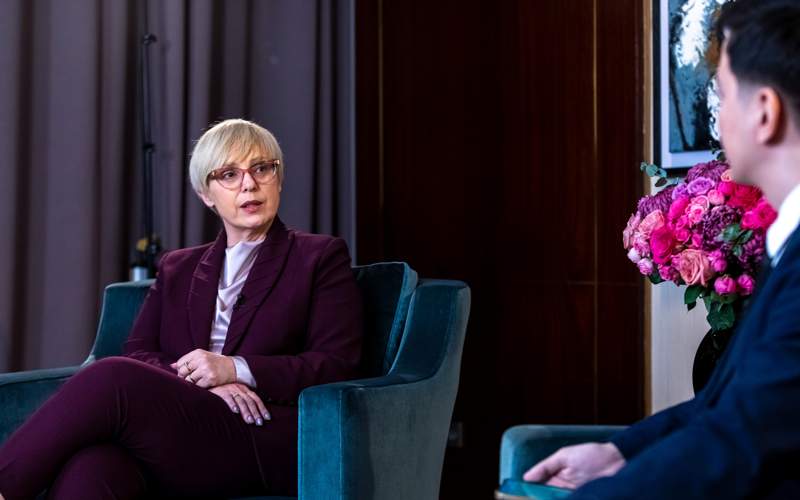
We also have the Josef Stefan Institute, the biggest scientific institute in the region, where 900 scientists from all over the world are exploring robotics, artificial intelligence, biotechnologies. This is something that we really do like as well. So the exchange of professors is something which should be put on another level.
Yesterday, I found out that we already have a music professor at the University of Ljubljana, a marvelous cello musician who performed a couple of songs at the concert yesterday. Music and culture are also areas that Slovenian people love to share, and we do like to see other cultures, other languages and other arts. This is also a field I'd love to see explored more.
Let me just tell you something. Today, I had lunch with your Prime Minister, and the Minister of Education was also there. He explained Kazakhstan's philosophy for acquiring foreign knowledge. Many universities around the world are sending professors and opening branches in Kazakhstan. And the reason behind is to keep the young people inside the homeland, to give them the best possibilities to study. And this is the right way to do it. So the people will stay here, learn a lot.
And just to tell you a little secret: China is doing the same, as are Arab countries. This is why some American universities are in trouble, because foreign students are no longer going to the United States, but are staying home and studying with marvelous expert professors from around the world, including from the United States. It's a very interesting project, and it’s working because, as the minister told me, many young people are staying in the country.
-Yesterday you had a lecture at the Nazarbayev University. Can we know more about it? What were the insights?
Whenever I go abroad, it's my privilege to be invited to give lectures at universities, and I was really, really happy to accept the invitation of Nazarbayev University. There was a full hall of young, prominent students who came to listen to me, what I have to say, what I wanted to say. The title of my lecture was "Small Countries and Their Position in the Geopolitical Variety of the World We Are Currently in," and I said to them, "The smallness is always only in your heads.”
Despite the fact that we are geographically small, we try to influence the world with ideas that are good for the progress of this planet. Gender equity was one topic I discussed, as well as artificial intelligence, because AI is bringing a lot of pluses, but it's also bringing a lot of minuses. So we have to be careful when developing these super digital tools, and we have to go over those obstacles. One thing should always be in our minds: let's just only do good for the society.
This is why artificial intelligence needs regulation and limitations. Not too many, but there should still be limits. Climate change was also a topic I discussed. Or if I should say with other words - Climate Crisis.
The goal was for this planet not to exceed a 1.5 degrees Celsius increase compared to pre-industrial times. Last year, in November, we crossed that line, so we are over 1.5 degrees Celsius. This is not okay.
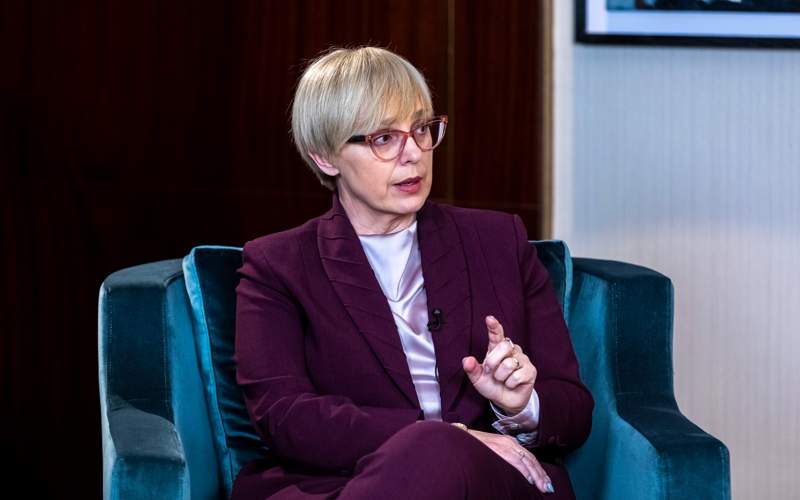
Despite the fact that the G20 countries, four European countries among them, are producing 80% of all carbon dioxide emissions, that does not mean the remaining 20% of the countries should just watch, step aside, and see what happens inside the G20 countries. No, every single country, even better —every single person on this planet— should put a tiny little stone into the mosaic of the green planet that we need to preserve.
This is what Slovenia is doing, and I want to emphasize one special topic: bees. These little, tiny animals produce every third spoon of your food on the whole planet. Due to pollution, bees are close to extinct, and we cannot let that happen. Slovenia has worked hard on World Bee Day within the United Nations, and May 20th is now officially recognized as World Bee Day. You should say “Thank you, Slovenia!”. It was a beautiful project, and we call it Bees for Peace.
As I mentioned before, Slovenia was one of the few countries that suggested to the United Nations the recognition of the human right to a clean and healthy environment. That was also our success. We also work a lot on gender equity. Together with Mexico and Spain, I'm a staunch supporter of so-called gender alternation project inside the United Nations.
Next year we are going to have 80th General Assembly of the United Nations. Do you know how many times a woman was presiding this body? Four times. So only four women were getting that job, and that's not fair, because women do represent half of the potential of this planet. Whenever I discuss feminist foreign politics, if you want me to say so, whenever I discuss gender equity, I never intend for men to have less, but for women to have equal opportunities. That’s what we strive for.
And just to mention one more thing: In 80 years of the United Nations, we haven’t had a woman Secretary-General. So that’s another goal I am looking at, and I hope Kazakhstan will be supportive in that way.
Smallness is in your heads. But if you want to be vocal about things that matter, size does not matter. If you believe in something, just do it. That’s the motto that I do have.
-Talking about bees, that was the main topic during your visit to a school. So you had a lecture with schoolchildren here in Astana. Could you also share more about it?
It was a beautiful moment that I had with your kids. They were drawing sketches, paintings, and pictures of bees, and I brought along some pictures of bees and honey from Slovenia, from the municipality that I live in, Domžale.
So, on the walls of your school, there were pictures created by pupils from Domžale, and then the pictures of your pupils. They also prepared a beautiful cultural program for me. During my short lecture, I told them: “Take care of bees and take care of nature, because that is the future—for you and for the generations behind us”.
Every single thing that you can do to preserve the planet is a plus, despite the fact that if it's a tiny little step, it's a step forward towards sustainability, circular economy, and green agendas, fighting against pollution, minimizing carbon dioxide, renewable energies to be boosted in every single country.
I did have a discussion about this also with your distinguished President, Mr. Tokayev. He understands green agendas—he really does—and I truly hope we will have many opportunities in the future to discuss topics that are important for this planet.
Of course, wars are not doing us any good. Currently, there are 55 armed conflicts around the world—the highest number since the Second World War. And this is why, and this is again connected to geographically small-sized countries, I believe in multilateralism. Because this is the only way to move forward.
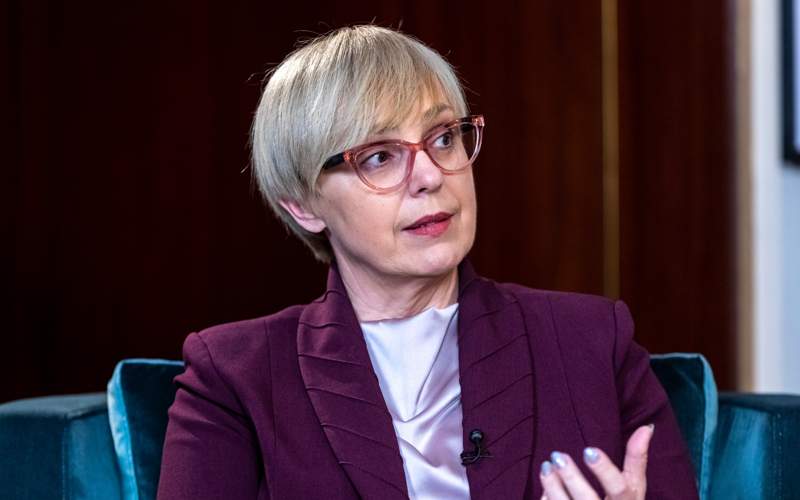
Big superpowers also have big—and super big—obligations toward the people of this planet. But inside the United Nations, there is one country, one vote. Twenty percent of the United Nations members—out of 193—are small island countries on this planet. They are losing their territory because they are sinking due to climate change.
And they have a voice in the United Nations. This is why it is so important to nurture the UN. Your president used to work for the United Nations in Geneva—he understands why multilateralism is so important. And Slovenia, now being in the Security Council, is very vocal about the things that matter. Very vocal. So I do hope that the United Nations will remain the multilateral fora, the only one we have, the global one. So this is what I believe in, and this is what I will always be vocal about.
- This often what, as you mentioned, our President Kassym-Jomart Tokayev often highlights, regarding the global role of the United Nations. What are the prospects for strengthening this unique platform as the United Nations to foster the global cooperation?
You know, sometimes it looks like the United Nations are in a lot of trouble. And they are in a lot of trouble. For the last 25 years, we’ve been discussing UN reform—but we were never successful. And the reason is because you cannot have a reform without the unified support of the P5 countries—the countries which do hold a permanent seat at the Security Council with veto powers.
Sometimes, I do have a feeling that we do have a kind of a hybrid war in the Security Council in New York, because the countries are using the veto to support the political friends in various political groups. What I do see is something that I do not like. So we have to discuss more into the fundaments —the reform of the veto powers of the Security Council.
You know, my idea that you can never use a veto when the mass atrocities are in question. That’s totally unfair and the pure legal hygiene is that the country which is debated at the Security Council as a problem should not have a right to vote, be it non-permanent or permanent seat country in the Security Council.
So there is a lot to debate, a lot to think about, and we have to remember that the United Nations were established after the Second World War, the most brutal war we’ve faced in centuries, very brutal. And the P5 countries, the countries with the permanent seat and the veto powers, are the countries who were the winners of the Second World War.
Many countries around the globe were hesitating to give them the veto powers, but we trusted them because we thought that they are aware of the fact that having a peace and stability is something that we have to work really hard on. This is not the case today, and I would really like to see this organization to be strong again, to have strong blue helmets, peacekeeping forces, and to have limited veto powers.
Without that, we’re going to be in troubles again, and again, and again.
-Yesterday we learned that you love the music of Dimash Qudaibergen. He's one of the musical symbols of Kazakhstan. He represents the culture, the art at the global stage. What makes his music so unique? And how does it influence the world's perception of Kazakhstan?
Music is peace, and I truly believe that Mr. Qudaibergen believes in that as well. I first heard him in 2018, when he was 24 years old. His beautiful, unique voice with a seven-octave range is something that only a few people on this planet possess. When I listened to his song S.O.S. in French without watching the video, I thought it was two people singing. But when I saw the video, it was just Dimash.
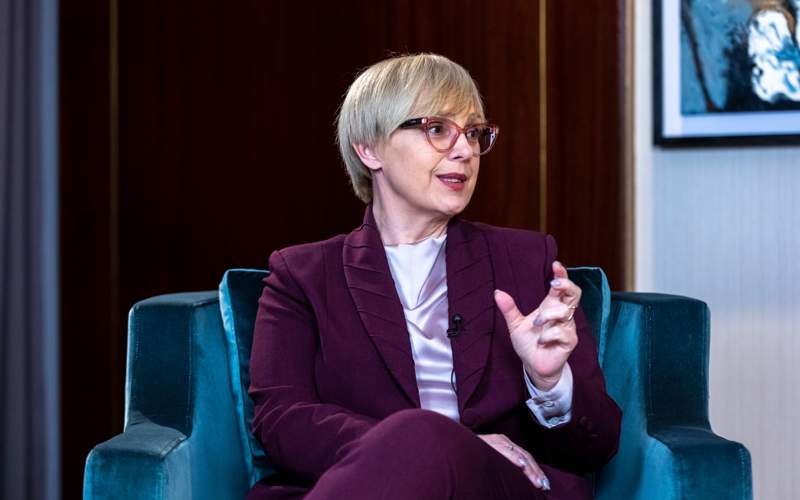
After 2018, I started looking for his concerts around the world. In 2019, I got tickets and went to St. Petersburg, Russia, to listen to him. I was even more fascinated because when you listen such a musician live, you can really see and hear the capabilities of his voice. He is truly a unique talent—a diamond, not only of Kazakhstan, but of this planet.
I was more than happy to meet him in person yesterday. He brought me a bouquet of flowers. I was really happy to talk to him. I’ll tell you one more thing about Dimash: In 2019, when I published that I was at his concert in St. Petersburg, Slovenian people became aware of his voice. And today we do have a Dimash Qudaibergen fan club in Slovenia. So also in my country, Dimash is a well-known artist.
-Is there anything that you would like to add?
Maybe just one thing. Slovenians do like to travel, and in my business delegation, we also have representatives from tourist agencies. Slovenia has a lot to offer, and I hope that now, after knowing that I, as the president, have visited Kazakhstan, people will take a moment to search the internet and discover the beauty of my country as well. I really do hope that in the near future, people from Kazakhstan will come to Slovenia and explore it. And just one data: 58% of my country is still covered with forests. We are called the "green treasure of Europe" or the "lungs of Europe." That’s what we are.
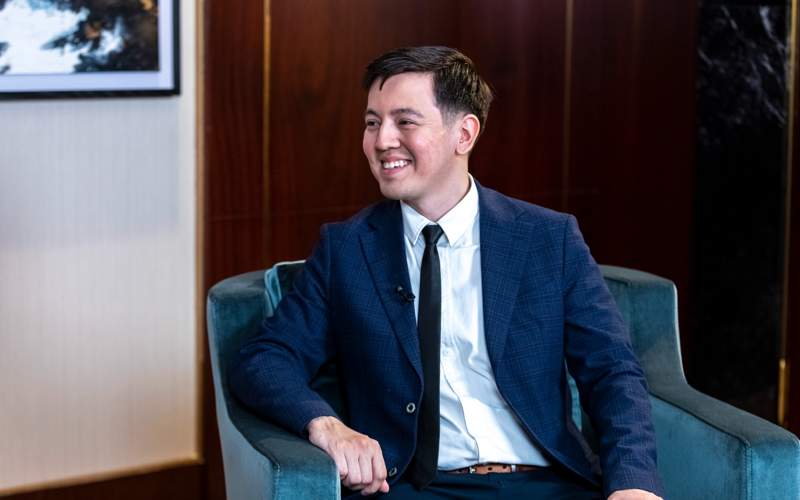
- That’s wonderful! I hope it will be just as you said.
- It will be, I’m pretty sure of it.
Earlier, Kazinform News Agency reported that Kassym-Jomart Tokayev and Nataša Pirc Musar attended Kazakhstan-Slovenia Business Forum in Astana.

